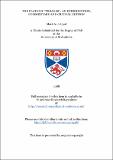The Platonic 'Theages' : an introduction, commentary and critical edition
Abstract
The Theages poses a number of problems for the interpreter of Plato and the Platonic dialogue. Traditionally, the most controversial one concerns the authenticity of the work: is Plato its author, and what criteria may be considered valid and important for settling the debate over authorship. But there are numerous other questions of at least equal significance. What is the purpose for which this dialogue was written, and what is its meaning. Is it merely a patchwork, as is commonly assumed, or does it display a structural unity. How does the Socrates of this work compare with the same character in other Socratic compositions, and what literary qualities can be attributed to the author's portrayal of the dialogue's other personae. How are we to evaluate the lengthy section in the Theages on Socrates' "divine sign". When was this dialogue written. What is its relation to the other works in the Platonic Corpus, to Socratic literature generally, and to philosophical interests at the time of its composition. The introduction and some of the appendices to this thesis attempt to offer answers to these questions, both through a comprehensive review and assessment of the critical literature on the Theages, and through the use of new evidence, argumentation, and interpretation. At the same time, a basis for the analyses offered here (and for future examinations of the Theages) is provided in this study by a detailed line-by-line commentary on the text. The text on which this commentary depends has been established from a fresh collation of all known manuscripts, early printed editions, and ancient testimonia, containing all or part of the Theages. This thesis represents the first attempt, in any language, to undertake the above programme of work on a definitive scale.
Type
Thesis, PhD Doctor of Philosophy
Collections
Items in the St Andrews Research Repository are protected by copyright, with all rights reserved, unless otherwise indicated.

